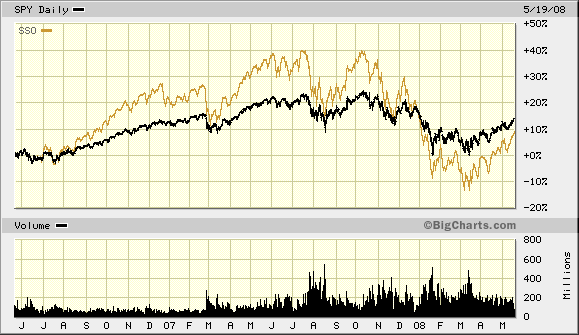Buyer beware on leveraged ETFs
Post on: 4 Июнь, 2015 No Comment

IanSalisbury
The Securities and Exchange Commission says leveraged exchange-traded funds confuse investors. The brokerage industry’s regulator has even fined big Wall Street firms for selling them to mom and pop.
But as far as the court system is concerned, it is still “buyer beware.” A ruling earlier this month, in which a federal judge tossed out a class-action suit related to leveraged ETFs from Proshares, offered the latest example of how tough it has become for aggrieved investors to argue that they have been misled by marketing.
RELATED STORIES: REAL ESTATE
Leveraged ETFs are designed to let investors magnify bets on the stock market over a short period, usually a single day. The complex vehicles proved popular with investors after their introduction in 2006.
But some misfired during the financial crisis, when big market swings caused bullish and bearish funds alike to plunge simultaneously — in some cases, by 50% or more over the course of a year. The reason is that because of daily compounding, long-term investments in leveraged ETFs often don’t mirror the indexes the funds track. Still, that sharp divergence from expectations prompted lawsuits over whether ProShares adequately warned investors about the risks.
In practice, the ProShares funds can’t guarantee that their returns will meet their goals over periods longer than a day. ProShares had always noted this limitation in its marketing materials, meeting the legal requirement that fund companies enumerate significant risks. But plaintiffs argued that ProShares played down the risks, and that the firm sent mixed messages by suggesting the funds could be useful for those who “rebalance” portfolios — something investors typically do with long-term holdings.
In his ruling this month, U.S. District Judge John G. Koeltl of the Southern District of New York dismissed the case against ProShares. His ruling concluded that the plaintiffs should have had a basic understanding of the risks, and that ProShares’s warnings had been as clear as the law demanded. Judges are reluctant to punish companies just because investors are disappointed in returns, says Brooklyn Law School professor James Fanto. “The bar is high” in such cases, he says.
In a statement, ProShares said the ruling reflected “the strength and quality of our disclosures.”

More broadly, legal experts say, investors who buy securities designed for big short-term bets face a tough sell in court because market timing is inherently speculative. “Judges often think, ‘These people aren’t widows and orphans, they should have known,’” says Wake Forest Law professor Alan Palmiter.
The ruling in favor of the fund company contrasts with a tougher stance taken by regulators against brokers who sell the products. Earlier this year the Financial Industry Regulatory Authority, which oversees brokerages, fined four firms — Wells Fargo WFC, -0.27% Citigroup C, -0.33% Morgan Stanley MS, -1.11% — a total of $9.1 million for marketing leveraged ETFs to small investors without proper due diligence. The firms neither admitted nor denied wrongdoing.
The Securities and Exchange Commission, meanwhile, reiterated its own warnings about the funds as recently as August.
Despite ProShares’ legal victory, the poor returns and adverse publicity may have spooked would-be investors. Leveraged ETFs, which held about $19 billion at the end of 2008, have roughly the same amount today. Assets in ETFs overall, in contrast, have more than doubled in that time.














